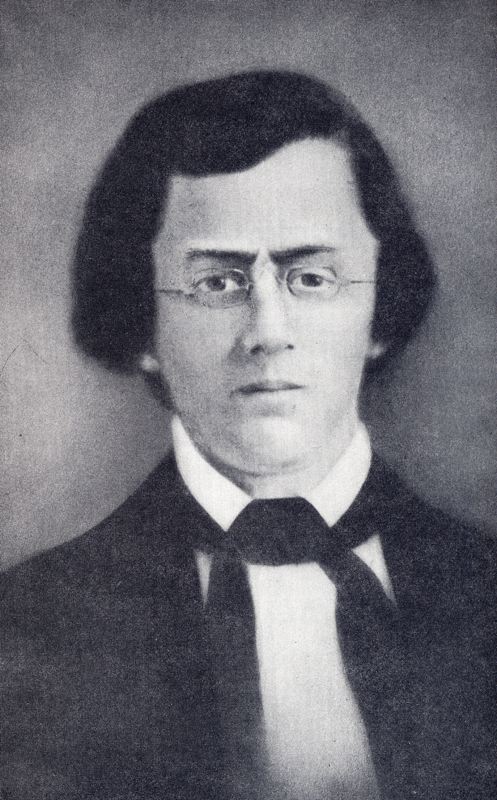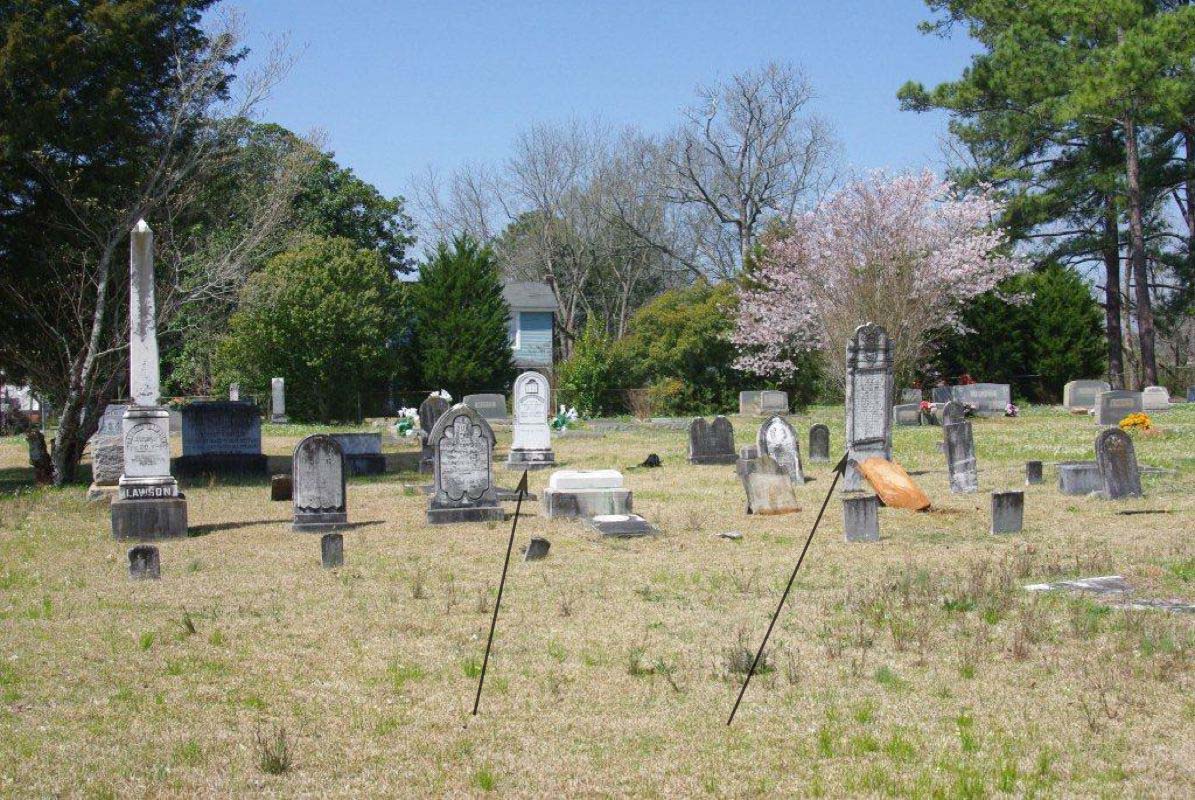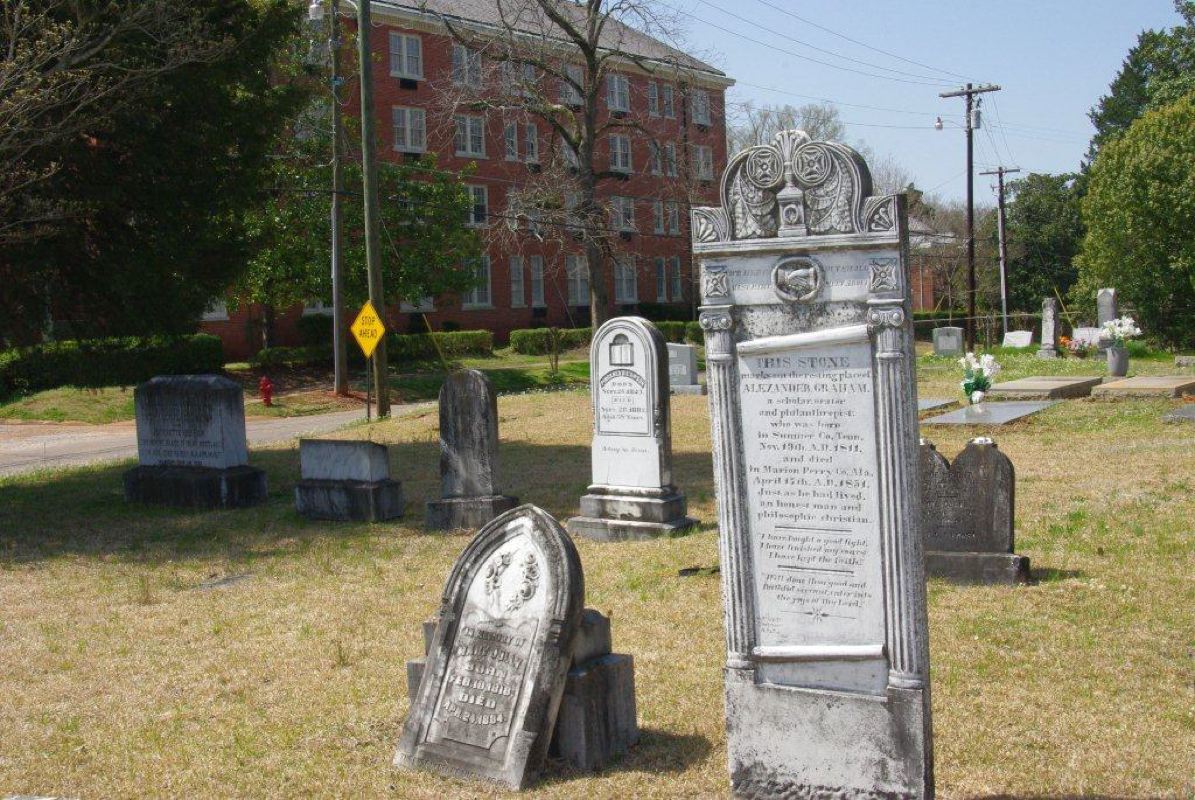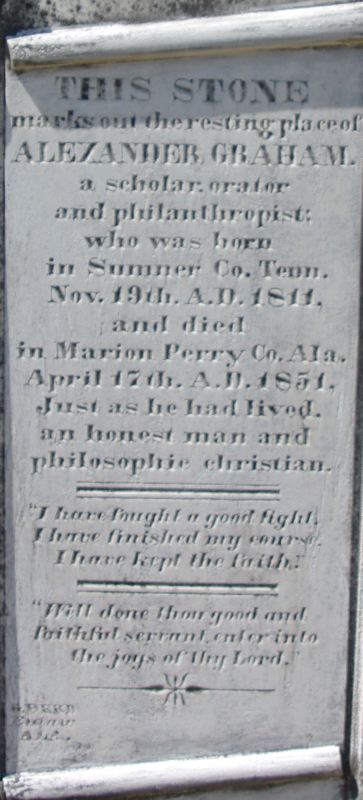Alexander Graham
1811-1851

![]()
The Life Of Alexander Graham
Alexander Graham was born two miles west of Hartsville, Sumner County, Tennessee, some fifty miles north of Nashville, on the 29th November, A. D. 1811. He was a small and sickly infant, and at the age of twelve months came near losing his sight from fever; indeed, never did he see very well out of one of his eyes. He was dyspeptic from childhood, and suffered a great deal from that and inflamed eyelids during his boyish days. He at a very early age acquired the habit of hard study, and though compelled to follow the plough because of his father’s inability to keep him at school, yet he found time to read by pushing his horse, getting ahead of the other boys, and then sitting or lying down in the corner of the fence with his book. Discovering such a desire to learn, his father sent him as much as his circumstances would allow to such teachers as the neighborhood afforded; but they were generally inferior, and knew only the common English branches of study. His habit while at school was to retire to bed immediately after eating an early and light supper, and sleep while the other children were at study; but preparing ash splinters (for they are the lightwood of Tennessee), he arose before dawn in the morning, and by breakfast was prepared for his recitations. At this age he was full of what we call dry fun, was continually playing off his innocent little pranks, but never failed to be prepared with his lesson. He showed then much more mechanical ingenuity than those who have known him of late years give him credit for; indeed, I recollect while I was a pupil of his he made me a clock lacking only the great brass wheel, and this, in that day and country, was considered a great feat, for machinery and Yankee ingenuity had not then picked the locks of English vaults and beaten the Queen’s yacht with a merchantman. He learned reading, writing, grammar, arithmetic, at these neighborhood schools, and then would teach awhile to pay for his tuition. He went a short time to Doctor Ring of Gallatin, Tennessee, with whom he commenced reading Greek and Latin; but his means giving out, he returned again to teaching and prosecuting his studies, and thus continued until about his twenty-fourth year, at which time he had by his own industry, I may say, acquired a fine English education, and read the Greek and Latin languages well. After his fifteenth year he became a man in his habits, was apparently very distant in his manners, spent all his time in reading and scholastic employments, and almost entirely segregated himself from society. I well recollect his little stone house, built by himself under some haw-trees in his father’s pasture grounds, where he sat to read during mid-day, and the little path where he walked and studied night and morning, near a beautiful and gently rippling stream that played over rocky crags, and seemed lost to the world, except that part of it where, in nature’s sweet solitude, he spent the cheerful spring, the long and tedious summer days, and the more propitious autumnal hours. Thus, during vacation, Saturdays, Sundays, and the times during which he had no other engagements, did he commune with favorite authors and with nature, drinking in the sweets of natural scenery, and feasting on the vocal melody in the surrounding woods. He spent much of his time too in composition both in prose and poetry. I know that most of those who knew him in his late years supposed him void of fancy, but he was not unacquainted with the muses, and often courted them, as various manuscripts show; yet he, from principle, loved history better than poetry, and logic than rhetoric.
At about the age of eighteen, having become interested in the subject of Christianity, he united with the Baptist church. He had come very near being a confirmed infidel, and had hard labor to overcome his difficulties. This was produced by the misconduct of professors, the divisions in the Christian world, and by having a skeptical inquiring mind which took nothing for granted. He must have every thing mathematically demonstrated, and as moral evidence could not, like figures, be reduced to this kind of certainty, it was with difficulty he could believe in the truth of the Christian religion. But to use a homely provincialism, “there is always a way wherever there is a will,” and especially wherever the Almighty has any hand in a matter. He sat down to the hard study of the Bible, its history, geography, chronology, morality, and the varied evidences of its truth and divine original; and got up, as every honest and impartial inquirer will after such an examination, convinced of its celestial origin, purity, and indispensability to man. A short time after uniting with the church, he happened at meeting when the preacher, Elder John Wiseman, was absent; the congregation were in suspense, he was asked if he could not read a chapter, sing and pray, to prevent an entire disappointment. His response was, I will try; and taking out his Bible, read a passage, and made a speech which would not have been a discredit even in much more advanced life. He continued to speak in public in company with Elder Wiseman on Sundays, and taught school during the week.
In the latter part of 1832, he took the charge of an academy six miles west of Paris, Tennessee, and preached regularly in the neighborhood. During this time he became acquainted with what was called by their friends, the principles or teachings of the “Christians,” or “Disciples of Christ,” sometimes known as “Reformed Baptists,” but by their enemies or opposers were called “Campbellites.” With their teaching he coincided, but did not quit his connection with the Baptists till 1834, after he had returned to Middle Tennessee. On the 5th February, 1834, he left Paris for his father’s, by way of Nashville, and from this time for several years I find manuscripts of his travels, avocations, discourses, reading, and many pieces of poetry, and some written addresses delivered at different places in Tennessee. His mind was just now beginning to develope itself, and his store of useful knowledge he had just begun to draw upon.
On the 30th of March, 1834, near Gallatin, Tennessee, he and a Doctor Anderson and one lady met together, and formed a worshipping congregation upon this broad principle, to wit: They agreed to drop all party names, to unite as body of Christians on the word of God alone, forsaking and abjuring all Creeds and Confessions of Faith. In his manuscript I find these words, written and signed by him on that day. “I was once a worldling, then a Baptist; but I discard every other name but that of Christ, of whom I am a Disciple.” During the time he was a Baptist preacher, a period of some five or six years, he wrote out a number of discourses on various subjects, and especially upon the subject of Christianity, the manuscripts of which I find in his papers; he also prepared for his own use a kind of Concordance of the Scriptures, a chronological table of the events recorded in the Bible, a synopsis of Ancient History, of the reigns of the different Roman Emperors, Jewish Rulers, and the Geography of the countries mentioned in the Old and New Testaments. I mention these matters to show that he made the Bible his chief study; and it was his critical examination, and clear understanding of that blessed Book, that induced him to take the step before mentioned, of forming the little church near Gallatin. This is clear from letters and notes in his manuscripts, which show he knew nothing of Mr. Campbell up to 1830, except the misrepresentations of him published by his enemies, yet he had evidently learned the principles taught by him to some extent from his friends in Paris. After taking this decided stand against what he deemed sectarianism, he preached 1st June, 1934, at Second Creek, where he had been a member of the Baptist church, from viii. chapter of Acts of Apostles, of which discourse I have a manuscript copy, and shall append to this work if I can do so without transcending my limits, for the purpose of showing how clear were his views of the Scriptures at that early age of his change of faith, how perfectly in accordance with all his subsequent preaching, and also with what kindness he treated those who had been and whom he wished still to consider his brethren, how little he deserved the uncharitable treatment he received soon after from his father in the faith of the Gospel, and the sectarian world generally in that region. It is unpleasant to rehearse the slanders propagated to his prejudice, the misrepresentations of his preaching, and the personal coldness with which he met from former friends and associates. I have heard him speak of it, but as I know his forgiving spirit had buried it all in oblivion long before his death, I will not now renew it, but will quote a few lines, being the commencement of his introduction to a discourse delivered at Gallatin, in which he mentions these misrepresentations.
“Friendly Auditors: A public speaker who has the misfortune to be on the unpopular side of a question of general interest, labors under the continual danger of being misunderstood, and misrepresented. Never perhaps was this truth more clearly exemplified than in the present controversy in the religious world. There is scarcely a topic in the whole Christian economy, on which I have addressed the public, without being misapprehended or intentionally slandered.” In the copy of a letter addressed 10th June, 1834, to Messrs. Stone and Johnson, editors of a religious periodical, advocating the same gospel taught by Mr. Campbell, he says, he first knew the latter by the misrepresentations of him found in the “Baptist Chronicle,” to which paper he was a subscriber in 1830; that from these he had supposed him to be almost the antichrist of Scripture, that the uncharitableness of the Christian world had caused him to make his acquaintance through his (Mr. C.’s) paper, the Harbinger. He says also, that since he had taken the step of forming the little church at “Electa Cyria” before mentioned, he had met with frowns, and had gained hard names, but the little band were prospering, and at the end of that year they numbered forty. Though now much occupied in studying the Scriptures, preaching and repelling assaults, he did not neglect the pleasing studies of elocution and poetry, but composed many short pieces of the latter, and addresses on the former.
-- P. B. Lawson.
![]()
Obiturary in Millennial Harbinger
Brother Campbell: It becomes my painful duty to announce to our brethren, through the Harbinger, the melancholy intelligence of the late decease of our much beloved brother, ALEXANDER GRAHAM.
Bro. Graham was taken sick on Friday, and died on the next Thursday evening, 17th inst., at precisely 2 o'clock. His disease was inflammation of the stomach and bowels; the last bitter dregs of that horrible dyspepsia, under which he had suffered for years. He suffered the most excruciating pain during the whole time of his illness, but retained his senses perfectly, with very slight exceptions, until his last breath.
On Wednesday evening he requested me to dress him, and send for his friends; said he wished to see and talk with them, and then he was ready to die. This being done, he conversed with each one separately, and bid them adieu. He then called the young ladies of the school, and delivered them a calm, and a most lucid and feeling address. They each took his hand for the last lime. He called to his bed a Methodist minister, with whom, December 25th, 1849, he had a debate. “Bro. Hammel," said he, "I consider you a gentleman and a Christian brother. We have differed, and, in the heat of discussion, something may have escaped me calculated to wound your feelings; but if so, it was unintentional. We are both aiming at Heaven, and agree as to the great fundamental principles of Christianity. I trust in Jesus Christ's blood for salvation. There is no other name given under heaven by which we can be saved." After this he addressed his wife in the most affectionate and feeling manner, and then requested us to let him die; not to prolong his existence, as he was certain he must go. He lived, however, under the effects, perhaps, of stimulants, until next afternoon at 2 O'clock, during which time he gave us many exhortations; many assurances of his readiness to depart and be with God.
“Man wants but little here below,Nor wants that little long,"
was the close of one of his exhortations. Just before he expired, his wife, Sister G., asked him if he could speak? If he could, to do so once again. "Do you doubt me, Mary?" he remarked. "I am just as I have always been a firm reliance on Jesus, and a strict adherence to his commands, there is no danger. My trust is in him." Many other incidents, evincive, of his perfect readiness for death, might be mentioned, but deem it unnecessary to extend the limits of this sketch further. Your brother in the hope of eternal life, P. B. LAWSON. [I sympathize with the relatives, friends, and brethren of our deceased Bro. Graham, in their irreparable loss, and regret that the narrative of the remarkable and eventful life of this much gifted brother, communicated by our Bro. Lawson, is, with many such communications, reluctantly, but necessarily, excluded from our pages. Were we to give space to the documents of this sort sent us, we would have to fill many pages per month; which, however interesting to a few, would not be so to the thousands. We shall yet have to abbreviate many such communications. A. C.]
-P.B. Lawson, Millennial Harbinger, 1851, pages 359,360
![]()
Directions To The Grave Of Alexander Graham
Alexander Graham is buried in Marion, Alabama in the Marion Cemetery. The town of Marion lies about 80 miles NE of Montgomery. Head west out of Montgomery on Hwy. 80. Go through Selma and continue west on Hwy. 80. About 12 miles out of Selma turn north (right) on Co. Rd. 45. Go about 15 miles to the town of Marion. Go to the center of town and turn right on E. Lafayette Street. When you come to Judson College will be on your right and the cemetery on the left. The Graham plot will be close to the road, and very near his old friend and fellow preacher, P.B. Lawson.
GPS Location Of The Grave:
32°37'54.7"N 87°18'54.0"W
or D.d. 32.631867, -87.315002

Left Arrow Pointing To P.B. Lawson Monument, Right to Graham Monument

This Stone
marks out the resting place of
Alezander Graham.
a scholar, orator
and philanthropist
who was born
in Sumner Co. Tenn.
Nov. 19th, A.D. 1811
and died
in Marion Perry Co. Ala.
April 17th. A.D. 1851
Just as he had lived.
and honest man and
philosophic christian.
_______________
"I have fought a good fight.
I have finished my course.
I have kept the faith."
_______________
"Well done, good and
faithful servant, enter into
the joys of thy Lord."
![]()
Special thanks to Wayne Kilpatrick for sending in photos and information on the life and work of Alexander Graham. 04/2010
![]()
Recent Additional Information
22.01.2018
Scott,
Graham moved to Springfield, Illinois, in 1838. During his time there, which may have only been a year, he edited a periodical called The Berean. N. S. Haynes page 663 states:
"The Berean. Alexander Graham came from Tuscaloosa, Ala., where he had published The Disciple, to Springfield, Ill., in 1838. There he founded The Berean. It was a 'monthly magazine, neatly gotten up on good paper and contained much sense and valuable information.'" Evidently it was short-lived.
Copies of the Berean exist at the University of Indiana and the Disciples of Christ Historical Society. I hope to visit IU this spring to look at the Berean. The DCHS copy is not available for viewing at this time. Since Graham was from Alabama, it is possible he mentioned his time in Alabama when he wrote articles for the Berean or that the Berean has correspondence from people he knew in Alabama.
Do you know if any copies of his Alabama paper are extant? It would have been a good source for early Alabama information on the Restoration Movement.
All the best,
James L. McMillan
Terry Gardner responded:
Jim, I am not following what you are calling his "Alabama paper" ... do you mean "The Disciple"? If so, there are copies at the Samford University Library and also at Brandeis University Library. Also note that P. B. Lawson (Alexander Graham's nephew) published, "The Life and Character, to which are added some of the Addresses and Sermons, of Alexander Graham, Teacher of the Christian Church in Marion, Alabama." This book was published in New York by John F. Trow, Printer, 49 Ann-Street in 1853. The biography portion of this book is about 17 pages. I transcribed two short chapters for this List in June and August of 2007. There was no interest in Graham at that time and so I ceased from my labors. Good hunting.
![]()
